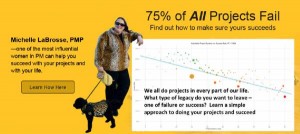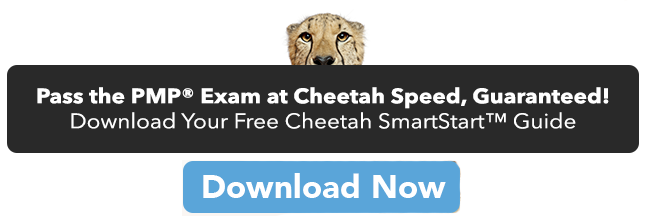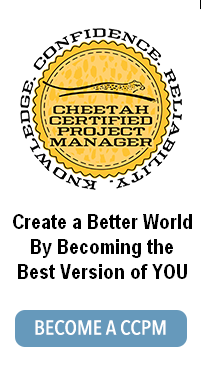High Performing Business – Project Initiation – Competitive Strategy
Michelle LaBrosse, CCPM, PMP, PMI-ACP, RYT
I was contemplating how Michael Porter’s work on Competitive Strategy: Techniques for Analyzing Industries and Competitors, relates to Project Management. The first area is with the impact people experience in their careers when they earn the Project Management Professional (PMP) credential – as it tracks closely with what Porter describes on how to be more competitive. The second is how Porter’s approach can influence our abilities to pick the right projects to pursue in life. In Porter’s book, he identifies five forces that increase a company’s abilities to be competitive in a market. Analyzing project choices through Porter’s Five Force lens’ makes sense in any market for any project. What this analysis does is help you hone in on those projects where you already have a competitive advantage and can play out an effective competitive strategy.
So lets look at Porter’s Five Forces and their relation to the project of becoming Project Management Institute (PMI) Project Management Professional (PMP) certified (if you’d like to learn how to extrapolate this to evaluating other project opportunities, check out Cheetah’s Project Turnaround course.)
Barriers to Entry – To increase the barriers to entry you need to choose projects where it is harder for others to enter the market then it is for you. Let’s say you already do projects (mostly this is everyone as we all do projects in varying degrees). You could call yourself a “Project Manager” without any credentials or education and many people do this. It’s estimated worldwide there are over twenty million people who label themselves this way. Yet, there are only 600,000 people who hold the PMP credential. This is why credentialed Projects Managers who hold the PMP earn twice what their non-credentialed counterparts make as they reduce risks, follow strict budgets and ensure accountability. If anyone can say they are a Project Manager, how is someone who needs to hire a Project Manager confident they are getting someone who really knows what they are doing? The credentialing process to become a PMP can be quite complicated if you are not really sure what you are doing. So this makes becoming a PMP a barrier to entry (harder for some than others). If you’re savvy enough to enroll in Cheetah’s PMP Exam Prep course – the path before you is well defined, quick and easy to follow. Cheetah’s approach is a 15-year proven, comprehensive solution that significantly reduces your barriers to becoming a PMP.
Bargaining Power of Customers – To become more competitive, it helps if you are creating a unique niche that is underserved by others. It is often difficult to enter into a market that is already well served by many others. When anyone can call themselves a Project Manager, the title becomes somewhat meaningless without some type of governing body telling us what exactly are the roles and responsibilities of a Project Manager. This is the charter of the Project Management Institute (PMI) and the purpose of their growing global certification for Project Managers (the PMP). This is an instance where it does really pay for the customers (those hiring project managers) to have more power. When they have more power, they can demand the Project Managers they hire have the industry standard credential for being a Project Manager (the PMP). Many large companies and government agencies are claiming this power too as it’s becoming the standard to hire people for Project Manager openings with PMP as a requirement.
Let’s get even more granular here. If you were hiring a Project Manager, who do you think is a better candidate; someone who has some experience with Project Management or someone who has the same experience, AND passed a very difficult PMP Exam and now has a PMP certification issued by the Project Management Institute? Even more, would you prefer to have your projects drag on and on with a greater risk of failing or having someone who got into it right off the bat, getting it done the fastest way possible and succeeding – like those who become PMP certified with Cheetah’s four day accelerated prep approach? When you make decisions that show you know the value of time in making choices that help you become more successful, others have confidence you will lead their projects with the same capability. This is why Cheetah students rise up in the ranks faster than their counterparts who take months and months to prepare for the PMP exam.
Threat of Substitutes – This relates to the uniqueness of a the solution to solve a particular problem. If the problem can be solved many other ways, the solution is not as good. When you are selecting projects to pursue, make sure the project you are working on won’t be derailed by some new solution that removes the need for your project’s solution. The threat of substitutes from the PMP perspective are other PM credentials. The main reason the PMP credential has grown rapidly is because of the worldwide, cohesive appeal. The Project Management Institute has done a fantastic job of creating a global community around a common Project Management standard. When we all speak a common language on how to do projects, our projects can move along quickly and efficiently. This is what every PMP across the globe shares – a common language for doing projects. And speed is an important consideration in the world as the longer projects drag on, the less likely it is they will come to a successful conclusion. The same is true for preparing to become PMP certified. Preparing for the PMP exam is like any other project – after six months of prep, 40% of people fail the PMP exam, but with Cheetah’s approach with four days of prep, 98% of people pass. When you make the effort to become PMP certified at Cheetah speed, it reduces the threat of substitues as it makes you the leader of the pack in a competitive sea of Project Managers – even those holding the PMP.
Rivalry – How strong is the base of competitors in the market? The threat of rivals is based on the number of competitors, the opportunities for growth, the stability of the industry, how easy is it for you to differentiate yourself, the ability to scale to meet demand, and the investment people have to keep making to stick around in the industry. When picking a project to pursue, understanding what your rivals are doing can help shape what solution you create with your project to reduce the threat of rivals. In a labor pool where only 3% of all Project Managers worldwide hold the prestigious PMP credential, you can become a small minority of top leaders who significantly reduce the threat of other Project Managers vying for the top career opportunities.
Furthermore, 10% of all PMP’s certified do so through Cheetah Learning. While this is an impressive brand leader position for Cheetah – what this means for you is you can further differentiate yourself as someone who not only can become a PMP, but did do so at Cheetah Speed. Cheetah also makes it very easy for PMPs to maintain their PMP credential. One of the key techniques people learn in Cheetah’s four day exam prep program for the PMP is how to learn fast. It is this ability to learn fast that helps Cheetah PMP’s pursue new opportunities fast as when you can learn fast, you can change fast. Additionally to keep your PMP credential, you have to earn 60 hours of continuing professional development every three years. Cheetah Learning continually creates online programs for their PMP’s to take to help them maintain their leader of the pack positions in their respective industries. It’s no surprise that the highest paid Project Managers across all industries are the people who have held the PMP the longest – as this shows they have the most capability to stick around in the industry. This reduces the threat from the less organized or ambitious Project Managers.
Strength of Suppliers – How much power do suppliers wield over companies who are creating services and/or products in the market? It’s based on how many suppliers are in the market and how big of a role you can play in getting price breaks based on the volume of business you can give a supplier (which changes as the economy changes). This is fascinating to look at from the perspective of becoming PMP certified.
- There are a number of ways people can prepare to pass the PMP certification exam. Cheetah Learning is the brand leader for accelerated PMP exam prep and has held this position consistently for over 15 years. During this time dozens of companies have come and gone offering what they say is a “cheetah” like accelerated approach. Many claim they offer the same program, yet when you look under the hood they are missing many of the proven accelerated learning approaches that help Cheetah students succeed in their careers (and in life) way beyond passing the PMP exam. It is why most Cheetah competitors leave the PMP exam prep business in less than three years. So what does this mean for you if you are considering becoming PMP certified? Cheetah is a very strong supplier, but you need to be strategic if you want to go with the brand leader and not a knock off (who states they are just like Cheetah).
- Cheetah Learning purposefully keeps their class sizes small so our students have the best chances of passing the PMP exam. Cheetah offers classroom courses around the US weekly and onsite for companies that have at least ten people. Good Project Managers register for Cheetah’s PMP exam prep program early to make sure they can get the class at the location and time that is best for them.
- Cheetah receives many students who have failed after participating in other PMP prep programs. This is not surprising because most other companies, colleges or PMI chapters offering PMP exam prep only teach several times a year. It’s hard to stay current in all that is required to pass the PMP exam when you only teach the program a couple times a year vs. Cheetah Learning who often teach their four day PMP course a couple times a week.
- The companies that experience the most profound improvements in their bottom line are those who train a whole cadre of people to become Project Management Professionals. These companies also get the best deal from Cheetah Learning by bringing us onsite or arranging for a large group to register for public courses at their corporate rate. We studied the annual reports of all the publicly traded companies who sent the most people through Cheetah’s programs over the last decade and 90% of those companies increased their revenues, while decreasing their costs (the sign of consistently well run projects). Working for a successful company can significantly help your career prospects as well. One of the reasons winners keep winning is because they make consistently good choices for important life decisions (like how to prepare to become PMP certified).
- Cheetah Learning students and the companies they work for say going with Cheetah Learning is the best decision they ever made. It’s why the largest and most successful companies worldwide have Cheetah Learning on speed dial as a preferred vendor. The strength of your suppliers matter for creating your strength as well.
When you are evaluating projects to pursue, you need to do a little bit of homework to learn how competitive you and/or your business can be in that market. At this stage of the game, learning how to ask the right questions is more important than having the right answers.
-
What are the barriers to entering this market? What are the barriers that make it harder for others than for us to enter this market? What are the barriers that might make it harder for us than for others to enter this market?
-
How many options do customers have to solve this particular problem?
-
How many different ways can customers meet their needs in this area?
-
How strong is the rivalry in this market? Are their one or two big companies, or a lot of small businesses supplying this market?
-
What type of suppliers are needed to deliver goods and services in this market? How capable are these suppliers to meet demand? What could change with the suppliers that could significantly impact your project?
In Cheetah’s course Project Turnaround – students learn how to analyze their various project opportunities for those that will create the most significant competitive advantage for them going forward.
Considering there are over 20 million people who call themselves project managers and only 600,000 of those are Project Management Professional (PMP) certified, holding the PMP creates a competitive advantage in many industries (it’s why people who hold the PMP earn up to two times more than non PMP certified Project Managers. Learn how you can become more competitive by following Cheetah’s proven strategy – download Cheetah’s free Smart Start Guide for the PMP Exam.



